- Home
- Wendy Higgins
Unknown Page 12
Unknown Read online
Page 12
“Oh . . .” He leaned to the side and pulled something silver and crinkly from his back pocket. “Sorry, it’s probably broken.”
A PopTart. I tore it open like an animal and moaned at the smell of cinnamon and brown sugar. I nearly choked on the dry-ass pastry as I shoved it in my mouth. Rylen gave the road a small smile as he drove us away, leaving the wreckage and sickness far behind.
For now.
We were halfway home, both lost in thought, before he finally spoke again.
“I know you’ve been upset with me,” he said. My body tightened at the onslaught of grief and guilt. I stared down at the crumpled wrapper in my hand as he continued. “I’m sorry I didn’t tell you about Livia right away. I know you don’t take surprises well. I should have called or something.” He ran a hand over his head and let out a long breath. “It . . . I don’t know, I think I was still in shock myself. It happened sort of fast.”
My gut twisted hard. I had to force myself to say something. “She seems . . . really nice.”
“She is,” he said, grasping my words eagerly. “She’s a good girl, Pepper.”
I nodded.
“She’s been through a lot.”
Just like you, I thought. I wondered what she’d been through, but he said nothing more. Part of me wanted to know everything, but that broken part of me still wanted no part of it.
“I’m sorry,” I whispered. “For how I’ve been.”
He shot me a small smile, as if to say no worries. And I vowed not to let my feelings make me act rude to him or Livia anymore. I had to get over this. I loved him too much to treat him badly, and if he loved Livia . . . well then, I needed to treat her well too.
“It’s funny,” he said quietly. “When you’re overseas, in warzones, after a while the people you love start to feel like fairy tales or something intangible. So far away they’re not real. You start to look for any small human interaction that makes you feel something.” He grasped his earlobe. “Sorry, I’m not making sense.”
“No,” I said. “You are.” I’d been watching him, hanging on every word.
He watched the road for another minute, staring at the beams of headlights.
“I guess the point of all that was to say that when I saw Livia . . . I felt something.”
I watched the side of his face as he stared ahead. He’d felt something. Something big? Or just . . . something good? I didn’t know. All that mattered was that I’d been far away—a distant memory—and he’d felt something in that moment with her right in front of him, something special enough to hold on to. And now he would stand by that choice.
“Okay,” I whispered. I faced forward and didn’t look at him again.
I slept until nine thirty the next morning. That was long for me, but I still awoke groggy with my head pounding. In the bathroom, I stared down at the water in the toilet. The plumbing was working for now, but that water . . . it seemed so innocent, so normal, but I’d spent the last part of the day yesterday seeing how organisms in that water were killing people. Being terrified to use the bathroom was a whole new level of strange.
I went to the backyard and peed against the wall. I couldn’t believe it had come to this. An antibacterial shower would be amazing right about now.
I joined my family in the kitchen and saw my mom lifting a bottle of water to her lips. I cried out and raised a hand. She jumped and said, “What?!”
My heart was pounding erratically.
“It’s bottled water,” Dad said soothingly. “It’s not from the tap, Amber.” He, Mom, Abuela, and Grandpa were all staring at me.
I collapsed into a chair, holding my aching head, my heart slowing. I was sure Dad had told Mom everything last night because I vaguely recalled her sitting next to me on the bed and petting my hair.
“Don’t even wash your hands in it,” I said.
“We haven’t let any tap water touch us since the DRI gave us the warning,” Mom assured me. In truth, my headache was probably due to dehydration. I’d been too terrified to drink any water yesterday as the infected patients streamed in.
“We boil the hell out of the water before we use it,” Grandpa said. I nodded and eyed the coffee. I knew the germs had to be dead, but I still could not stomach the idea of drinking anything that had come from those faucets.
Abuela got up and went to the camping stove, filling a bowl with scrambled eggs, black beans, and rice. She put it in front of me and sat beside me, rubbing my back.
“That’s the last of the eggs,” Mom said to Dad. They shared a look. They’d been keeping the eggs and dairy stuff on ice in a cooler, but the ice was now melted.
“It’s been days,” he said. “They should be getting the power up and running now. This is getting ridiculous. I asked the grocery store manager when their next shipment would be in and he said he had no idea, and that their generator was about done.”
Grandpa shook his head and gave a gruff grunt. “Don’t tell anyone about our goods. They’ll be over here trying to get their hands on it.”
Nobody said anything to that. Times weren’t desperate enough to ravish neighbors’ homes. But if the power remained out, and stores weren’t replenished, and people couldn’t access their money to be able to buy or trade . . . what was going to happen? Especially with the water being infected. Water was a necessity, and bottled water sources in local stores were already gone.
I shivered, and Abuela rubbed my back again.
I ate all of my breakfast and then made my way to the pantry where I picked up a bottle of water. I wasn’t prone to anxiety, but I felt panic symptoms as I unscrewed the cap and tilted the bottle up to my mouth. What if these water bottling companies had been infected as well? People could live without food for a while, but not without water. My body needed the liquid so badly that I chugged the entire thing, despite my terror. By the end there were tears in the corners of my eyes. Please don’t let me get sick. I stood inside the pantry, breathing hard, trying to hide my near-anxiety attack from my family.
My arms prickled, as if the burn of whelps were rising on my skin. I rubbed my hands up and down my arms. I couldn’t see anything. But I was so hot I broke out in a sweat. Was it a fever? I could feel hives rising.
The pantry door suddenly swung open and Mom’s eyes widened when she saw me hunched over on myself, sweating.
“Dios! Baby, what’s wrong?” She pulled me out and the others rushed over. The kitchen was so much cooler than the pantry. Mom ran a hand over my forehead, smoothing back my hair, the worry apparent on her face. Dad looked me over.
“Are you feeling okay?” he asked.
“Is she sick?” Grandpa yelled too loudly.
I looked at my arms again, then down at my legs. Normal. I felt my cheeks. Cool. Oh, my God . . . it had all been in my imagination. And now I was shaking all over.
“I just . . .” I stammered. “I’m okay.”
Mom wrapped an arm around me and led me into the living room, down onto the couch. “Listen to me, Amber.” She took my chin and forced my eyes to meet hers. “You need to take this day off.”
I shook my head. There was no way.
“You listen,” she said again. “Take the morning off. You are going to make yourself sick.”
I closed my eyes and leaned my head back, slumping. I really could not imagine getting in the car and driving to that elementary school right now.
“Okay,” I said. “I’m going to take some ibuprofen and rest until after lunch. And then I really have to go.” I looked at her again. “They need me. So many people are sick from the water—”
“I know.” She squeezed my forearm and got up to get me another bottle of water and some meds for my headache. She watched me as I looked hesitantly at the water, even sniffing it, before I finally drank. “Just promise me, Amber . . . if you see any suspicious people walking around . . . any suspicious packages or boxes or bags, you run. Don’t worry about anyone else. You can’t save everyone. You run.” The adamancy in her vo
ice made me nod.
My stomach was too full. I lay my head back again, hoping I would not puke up all of the water I’d forced down. I took even breaths, trying to relax. When I felt better, I went into the bathroom and scrubbed myself down from head to toe with antibacterial wipes, then pulled my hair back into a slick, high bun. Mom tried to talk me into going back to my room, but I wanted to be with them. So she had me curl up in the corner of the couch with a pillow and blanket.
Dad turned on the radio and we all sat together, listening. The news was dire, even more so today.
“The Eiffel Tower has fallen,” the newscaster announced. Holy shit. “I repeat, the Eiffel Tower. . .”
“God damn it.” Dad grasped his head in his hands and leaned his elbows on his knees.
Things were not getting better. They were worsening. Hearing the details spout from the radio, I felt like I might sink under the despair. It was as if whoever was responsible wanted to wipe out all of the world’s history—every symbol of culture and pride. They wanted to leave us with nothing, and it felt like they were against everyone on earth. Anyone who thought the attacks were from the Middle East was flabbergasted when oil refineries were blown sky high. The ruler of North Korea and half his army? Gone. That shady Russian leader? Adios. This was like a serial killer of epic proportions, leaving lands in anarchy.
Looking around at my family, it made me miss Tater and Rylen so much. Even though Rylen was only a potato field away, he seemed so much farther than that. And Tater . . . I wondered how he was. I hoped he was keeping safe, and not drinking the water.
I nearly jumped out of my skin when the front door flew open. Ry’s key was in his hand, and his face swiveled over our family members until his eyes locked on me.
His face was ghostly white. “Pepper . . .”
“What’s wrong?” I sat up, flinging off the blanket.
“My dad.”
I grabbed my medic kit from Mom’s car and sprinted behind Rylen through his potato field. We rushed up the steps, through the creaky screen door that slammed behind us. Inside smelled musty, like old furniture and old scents of grease that had yellowed the walls and ceilings. The throw rugs were threadbare and faded. The place was cluttered, with junk piled up in corners, but otherwise clean.
I followed Rylen into a family room area with a television on a card table and a velvet picture of dogs playing poker above a worn out couch. Livia was sitting on the floor by Len Fite’s head, dabbing a damp cloth to his face. He took up every inch of the couch. My breathing quickened when I saw his arms and those telltale splotches. His long, gray hair was wet with sweat. I dropped to my knees next to Livia, and she scooted out of my way as I put gloves on. We still weren’t sure if this thing was contagious, so I wasn’t taking any chances.
He didn’t move or react as I took his vital signs. I sat back on my haunches. Rylen stood with his arms crossed, watching us, chewing his thumb nail. Livia perched on the end of a rocking chair.
“He has it,” I whispered. “We still don’t know what it is or if it can be cured. I’m hoping someone from the DRI will have more information today from the samples they took.”
“Is he gonna . . .” Rylen began, then stopped. “I mean, were people yesterday . . .”
“Nobody died yesterday, but some became nonresponsive by the end of the day, like this.” I was frightened to return today and see how the victims were faring. But an urgency rose in me to do just that. “I need to go in.”
“Can I take you?” Rylen asked. We both looked at Livia. “Do you mind staying with him while we try to find out what to expect?”
Her eyes darted, and I didn’t think she fully understood, so I translated into Spanish for her. The look of complete gratefulness she gave me at the sound of her native language broke my heart. She nodded and looked up at Ry.
“Sí. Yes. I stay.”
“Thank you.” Rylen leaned down and kissed her forehead before darting out of the room to grab his keys.
In Spanish, I told Livia, “Go to my house if you need anything at all. And here.” I handed her a pair of gloves. “Don’t touch any of these open sores with your bare hands. See if you can get him to drink any broth or tea made from boiled water. We have some at our house.”
She nodded again.
We set off for Clark County, and it was weird to see so few cars on the streets. No cops either, so Rylen went twenty over the speed limit.
“I guess everyone’s conserving their gas,” I said.
He sighed as he looked out over the ghostly town. Even the fields seemed abandoned and sad. Rylen had a crease in the middle of his forehead that made me reach out and touch his forearm. He tensed so I let go. I wanted to tell him everything would be okay with his dad, but that could be a lie. So instead, I gave him the only promise I could.
“If there’s a vaccine, I’ll bring it to him.”
Rylen swallowed hard, his Adam’s apple bobbing down and back up. We drove in silence a bit longer.
“Have you seen your mom since you’ve been back?” I asked.
“Yeah.” It came out as a grunt. “I checked on her last night before I went to see your folks. While everyone else was at the grocery store, she was raiding the liquor store, so she’s all set.”
I clamped my teeth together at the pain in his words.
“I told her I’m married, but I haven’t taken Liv to meet her. She wasn’t exactly happy about having a foreigner in the family.”
Ouch.
“How about your cousins?” I asked.
“Haven’t seen them. My aunt took them and moved to Reno two years ago.”
I didn’t ask any more questions after that. Since we were speeding, we made it to the elementary school in record time. It was still a shock to turn onto the street and see a giant hill of demolished cinder blocks and twisted metal where the hospital used to be.
Hundreds of people milled around the full parking lot. A line snaked out of the building, just as it had at the hospital yesterday. Two policemen with a K-9 roamed the area, hopefully sniffing for bombs or any other possible threats.
I wove my way through the crowd at the entrance and looked around for Julian, but didn’t see him. I spotted a DRI woman with a clipboard in the office area giving a nurse directions.
“Hi,” I said. “I’m one of the medics, Amber Tate—”
“Yes, I remember seeing you yesterday. Thank you for coming back in. We’ll need you in room 205 today treating wound victims.”
“Yes, ma’am,” I said. “Thank you. But can you tell me first if there’s any news about the water illnesses?”
Her face tightened, as if she were annoyed. “It’s viral. Non-airborne. Can only be spread by ingesting or sharing bodily fluids. Kills within two to four days.” Rylen hissed a breath in, but she thoughtlessly kept rattling off facts. “Eighty-eight percent kill rate from what we’ve gathered from the towns hit before us, all in the Midwest. Affects humans and animals, though other species simply become lethargic and then die, no rash. We’re calling it the Red Virus. No cure, but they’ve created a preventative vaccine in record time. The first batch should be here by tonight or tomorrow.”
She turned away from us to direct a man in scrubs pushing a gurney with a body covered by a sheet. Dear God above. My insides shivered. Len was going to die within days.
I was shaking as I faced Rylen. He stared at the gurney being wheeled away down the hall. Another gurney with a covered body came after it. The wrecked look on Rylen’s face made me grab his hand and pull him. I rushed us out of the dank, smelly school with its suffocatingly tight halls, out into the warm autumn sunshine. He let me pull him to the side of the building where I went up on my toes and circled my arms around his neck, pulling him close. He buried his face in my neck, wrapping his arms around my waist and holding me tight.
Why? Why were these things happening? What was the point of it all?
“I’m so sorry,” I whispered. He said nothing, and didn’t cry, just
held me like I was a lifeline he was afraid to let go of. Like his world might crumble if he didn’t have me. I know, I was being ridiculous—it could have been one of my parents or Tater, or his wife here to hold him and he’d probably be clinging just as hard. But I was glad it was me.
When I became overly aware of his hot breath on my shoulder and his taut body against mine, I gently released his neck and he let me go. His eyes were red, but not wet.
“Go home to him,” I whispered. “I’m going to work.” His eyes blurred for a second, lost in thought. He still stood close, our bodies brushing.
“What time should I get you?” His voice was hoarse.
“I don’t know,” I admitted. What time was it? Eleven in the morning, maybe? “You don’t have to come, Ry. One of my parents can get me.”
“What time, Pepper?” he asked again with patience.
“Maybe midnight?”
His eyes narrowed. “That’s over twelve hours.”
“Hospital staff work twelve-hour shifts all the time.”
He put his hands on his hips and let out a long breath. “One of us will be here at eleven.” Without giving me a chance to argue or say good-bye, he walked away from me. I watched his long strides, his lean waist and strong hips, and I felt a swelling buzz deep at my core—a feeling I had no business having anymore. I imagined Livia’s face and it was like stepping into an ice water bath. Now it was my turn to let out a long breath.
He was hers. She would be there for him today, at his side, helping to nurse his father in his final moments. Helping to comfort Rylen as he watched the man he loved most in this world face a downhill battle. As that familiar bout of jealousy began to claw its way up through the sludge of despair and grief, I turned and speed-walked to the entrance. Nothing like death, blood, and disease to take my mind off Rylen.
There was nothing to do for Red Virus victims except try to keep them comfortable. Our stock of injectable pain killers and I.V. fluids were long gone, with a promise from DRI on premises that more was coming. All we had left were pills, and many of the sick could not get them down. Half of the classrooms had been converted to ‘dying rooms,’ crammed with cots and wailing family members. Many of the rooms had battery-operated CD players, which we used to play soothing music for those who were sitting there all day and night, holding loved one’s hands who’d fallen into fevered sleeps that they might never wake from.

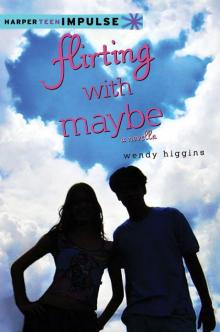 Flirting With Maybe
Flirting With Maybe Sweet Temptation
Sweet Temptation Sweet Evil
Sweet Evil Sweet Peril
Sweet Peril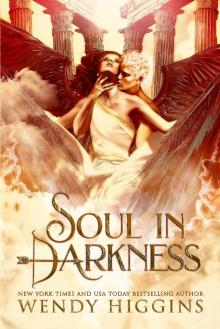 Soul in Darkness
Soul in Darkness Unrest
Unrest Sweet Reckoning
Sweet Reckoning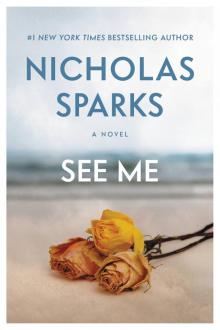 See Me
See Me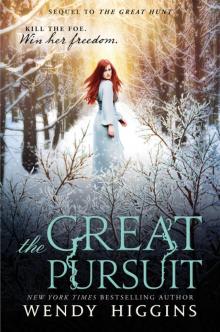 The Great Pursuit
The Great Pursuit Unknown
Unknown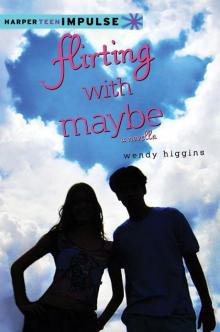 Flirting with Maybe: A Novella (HarperTeen Impulse)
Flirting with Maybe: A Novella (HarperTeen Impulse)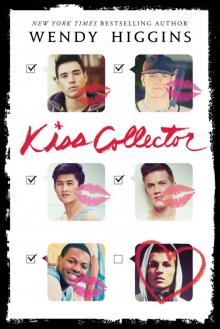 Kiss Collector
Kiss Collector Unrest (Unknown Trilogy Book 2)
Unrest (Unknown Trilogy Book 2)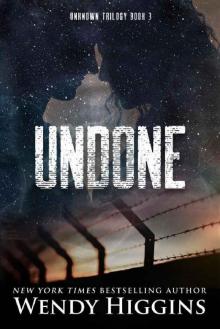 Undone (Unknown Trilogy Book 3)
Undone (Unknown Trilogy Book 3) Unknown (Unknown Series Book 1)
Unknown (Unknown Series Book 1)